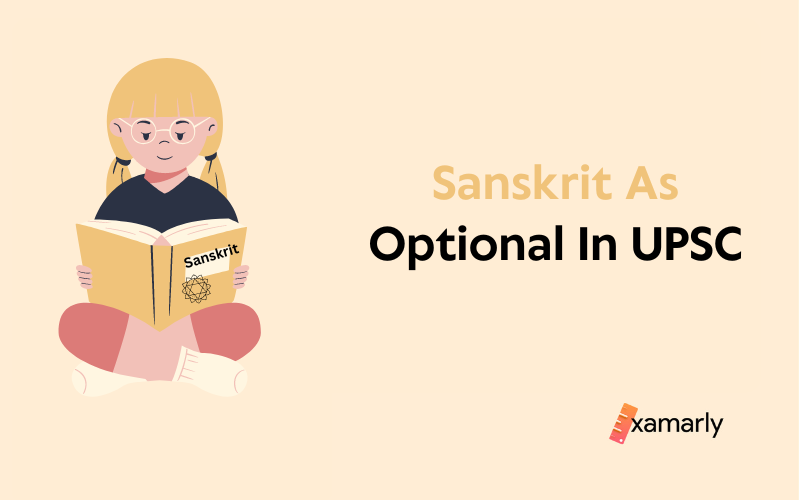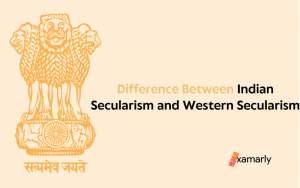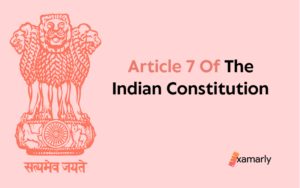Sanskrit is regarded as the origin of many of the Indian languages. Though the language is difficult to understand, UPSC has included Sanskrit as an Optional in the UPSC Mains exam.
This article will answer the queries such as “Is Sanskrit as an Optional in UPSC a good choice”? “What are the pros and cons of the subject” and what should be the preparation strategy to crack the Civil Services Examination? Let’s have a look.
- What Is Sanskrit As Optional In UPSC CSE?
- Comparison/Similarity With Other Optional Papers
- Advantages And Disadvantages Of Sanskrit Optional In UPSC
- How To Prepare Sanskrit Optional For UPSC?
- Importance Of Academic Background
- What Time Duration Is Required For Preparation?
- UPSC Sanskrit Optional Syllabus
- Overlapping Syllabus With GS
- Help With Essay Paper
- Help In Interview
- Recent Toppers Of UPSC CSE With Sanskrit Optional
- Success Rate
- List Of Books For Sanskrit Optional
- Conclusion
- FAQs
What Is Sanskrit As Optional In UPSC CSE?
Sanskrit is one of the ancient languages known to the world. Regarded as a challenging subject, it is gaining a spot of high-scoring Optionals in the Civil Service Examination.
Literature of the Sanskrit Language is an Optional provided by UPSC in the Mains Exam. The aspirant of any educational background can take up the Sanksrit Optional and score well and past data has shown that Sanskrit Optional is an emerging subject in the Civil Service Examination.
However, understanding Sanksrit is a tough task because of the difficult terms and less popularity among youngsters. But with proper preparation and basic knowledge, one can easily score good marks.
Moreover, the syllabus is short, static, and easy to complete, making it a reliable option for candidates.
Comparison/Similarity With Other Optional Papers
As compared to other Optional, Sanskrit literature is a scoring subject. Aspirants can easily score a decent rank by opting for Sanskrit as an Optional. The subject has a small syllabus which is one of the reasons for the success.
The optional syllabus includes lessons that are typically covered in GS exams, such as Trends in Indian philosophy and Ancient Indian Culture, which can save time.
Also, read: Best optional subject for UPSC
Advantages And Disadvantages Of Sanskrit Optional In UPSC
Advantages
The advantages of Sanskrit as optional in the UPSC Exam are many.
- It gives aspirants a break from preparing for GS Papers.
- Not many students choose the Optional paper as Sanskrit, hence, less competition.
- The syllabus is not vast and can be easily covered in a short span.
- In contrast to disciplines like public administration, political science, economics, etc., this optional has a static syllabus and does not need you to keep up with current affairs.
- The Grammar portion is important and can fetch you good marks.
- Easily scorable with the Fundamental knowledge of the subject. There are no criteria for being a graduate in Sanskrit for scoring good marks.
- The questions asked in the Mains Paper are simple and direct.
- Sanskrit depends heavily on formulas for many things. The language is really systematic and scientific, making it simpler than other languages.
- A short revision is required for thorough preparation.
- Only a few questions require answers in the Sanskrit language. Rest can be given in the medium of Examination opted.
- The topics like Indian philosophy, a part of ancient Indian history are covered in the Sanskrit literature syllabus. A great benefit for students preparing for GS Papers, particularly in tests on Indian philosophy and ethics.
- Purusarthas, Samskaras, Varnashramavyavastha, arts and fine arts, and technical sciences are highlighted as being essential components of Indian culture while trends in Indian Philosophy cover topics such as Mimamsa, Vedanta, Nyaya, Vaisesika, Sankhya, Yoga, Buddha, Jaina, and Carvaka.
Disadvantages
The Sanskrit Optional for UPSC also has some disadvantages:-
- The language is not approachable to many people, hence, students hesitate to opt for the subject.
- The coaching institutes offering coaching in Sanskrit Optional are few. Moreover, few Sanskrit teachers are there to help with the studies.
- The Optional is not advisable for students lacking even the slightest interest in the subject.
- A good test series containing practice questions are hardly available.
How To Prepare Sanskrit Optional For UPSC?
Basics are the key to success. If a student is not thorough with Basics, scoring good merit is next to impossible.
Mastering the Basics is crucial, especially for students coming from different backgrounds than Sanskrit.
Some useful tips for covering the subjects are-
- Know the whole syllabus before opting for the Optional. If aspirants are dead sure of their capacity, they may select the subject.
- Know the exam pattern and attempt the paper accordingly. For reference, Sanskrit Optional has two papers, both containing Sections A and B. Answers in Sanskrit are required by at least 3 questions in both sections.
- While Paper 1(Shastric) contains a mix of questions along with a portion of Grammar, the second Paper lay emphasis on the literature portion.
- Always refer to standard books when in doubt for an easy understanding of concepts.
- Prepare short Sanskrit optional notes for UPSC to help you in the eleventh-hour preparation.
- Revise the syllabus 3-4 times before the Mains Exam.
Importance Of Academic Background
The importance of Academic Background is what gives an extra push toward success. Compared to students who have not touched Sanskrit ever in life, the graduates have slight advantages.
For cracking any exam, a basic clarity of concepts is necessary. For instance, students who have a knowledge of Sanskrit at +2 level, can easily score in the Civil Service Mains Examination.
Though this optional is scoring in nature and has a small syllabus, the chance of getting high ranks is in the court of students already familiar with the language.
This obviously has nothing to do with the preparation and dedication, but with prior subject knowledge.
What Time Duration Is Required For Preparation?
UPSC Civil Services Mains Examination is one of the toughest exams to conquer. While the compulsory subjects are the same, the Optionals play a significant role in deciding the rank.
As a result, it is important to dedicate your time to preparing for Optional subjects as well.
When it comes to Sanskrit Optional, aspirants can easily cover the entire syllabus in approximately 4 months. The time becomes less if a Sanskrit graduate is preparing for the Mains exam.
UPSC Sanskrit Optional Syllabus
Paper I (Shastric) – The subjects included in the Sanskrit Paper-I of the UPSC exam relate to the traits, qualities, and contributions of the Sanskrit language. This section also includes certain general knowledge subjects like literary history, the Ramayana, the Mahabharata, etc.
- Grammar – Sangya, Samas, sandhi, Vachya and Karak.
- Knowledge of language –
- Main characteristics of Vedic Sanskrit language
- Prominent feature of classical Sanskrit language
- Contribution of Sanskrit to linguistic studies
- History of Sanskrit Literature – An important subject under this topic is ‘Kavya’.
- Sahitya-Shastra –
- Essay
- Sanskriti (Culture) – The subject has some topics which overlap with the GS Papers.
- Darshan (Philosophy)
- Unseen passages
Paper II (Literature)
Part -1
- Group 1 – Chayanit Mahakavya
- Group 2 – Pracheen Sahitya (ancient literature)
- Group 3 – Sanskrit Natak (Drama)
- Group 4 – Sanskrit Vyakhya
Part – 2
- Sanskrit Vyakhya – Mahakavya
- Sanskrit Vyakhya – Aarsh Kavya
- Hindi Vyakhya – Mishrit Kavya
- Hindi Vyakhya – Natya Kavya
Overlapping Syllabus With GS
It is an advantage if any Optional Paper has an overlapping syllabus with GS. This makes the preparation easy.
UPSC Sanskrit Optional syllabus also has some topics which can be covered in the GS Papers also.
Topics in GS such as Ancient Indian Culture and Trends in Indian Philosophy are a part of Sanskrit literature as well. This is an important advantage for students getting ready for the GS Papers, especially for the assessments on Indian philosophy and ethics.
Help With Essay Paper
Essay writing is not simple as the topic can be anything related to the subject. A good understanding of the entire Optional subject is important.
The essay topics are given from the subject itself, for instance, the Sanskriti and Darshan sections of the syllabus themselves serve as the sources for essay topics, and require a command of the language.
Since, the subject is routed to Indian Culture and Ancient history, writing essays would not be difficult as the aspirant contains knowledge of both the GS Papers and the Sanskrit paper.
Help In Interview
Sanskrit is a beautiful language and has been in India for ages. The language shows the Indian culture and traditions while also giving knowledge of the Ramayana and Mahabharata.
The Sanskrit Optional definitely helps in the interview by expressing the candidate’s thoughts beautifully. With a vast knowledge of the culture, aspirants can easily crack the interview process.
Recent Toppers Of UPSC CSE With Sanskrit Optional
Given below is the list of top scorers in the Civil Service Examination who have opted for Sanskrit Optional in the Mains exam-
- Aditya Kumar Jha in 2018
- Vijay Singh Gurjar in 2017
- Gaurav Singh Sogarwal in 2016
Success Rate
The success rate is nice since most students do not take this as an Optional subject, thereby reducing the chance of competition.
The success percentage was more than 10 and less than 15 in the years 2011 and 2012 while it was below 6 in the year 2013.
The rate keeps on increasing and decreasing with each successive year.
List Of Books For Sanskrit Optional
Standard references are helping hands of aspirants. The aspirants can easily rely on the standard books while preparing for the UPSC exam.
Some of the Books for Sanskrit Optional in UPSC are-
- Sanskrit for Beginners by Dr. Sunanda Shastri
- Sanskrit Swyam Shikshak by Shripad Damodar Satvlekar
- Rachnanuvadkaumudi by Kapildev Dwivedi
- Brihad Anuvad Chandrika by Chakradhar Nautiyal “Hansa” Shastri
- Sanskrit Kavi Darshan by Bhola Shankar Vyas
Conclusion
Sanskrit has a significant role to play in passing the UPSC examination, despite being a rare language.
Though the subject is high-scoring, many students avoid taking it as an Optional choice because they lack Sanskrit knowledge and concepts. Another reason for not choosing Sanskrit can also be attributed to the fact that this is not a Commonly-used language and many students do not have Language proficiency.
The unavailability of Coaching experts in the required field is also a major factor in the avoidance of the subject.
However, the positive side of choosing Sanskrit Optional in the UPSC Entrance examination is the short syllabus and overlapping of some topics with the compulsory papers.
The only thing that can help aspirants crack this prestigious examination with Sanskrit as Optional in UPSC is consistent and dedicated preparation. A thorough understanding of the subject is necessary and accordingly do the subject preparation.
Practice as many question papers as you can and parallelly start writing the essay topics.
Always remember, the key to success is always hard work and nothing else.
FAQs
How Is Sanskrit Optional For UPSC?
Sanskrit is a good choice for the UPSC exam since the subject is high-scoring with a finite syllabus.
Does It Help With The Preparation For Other Subjects?
Sanskrit Optional does provide an advantage while preparing for topics such as Indian Culture and Ancient Indian history.
Can Sanskrit Optional Fetch You Good Marks?
Indeed it can, provided you have a good knowledge of the subject, at least up to +2 level.






